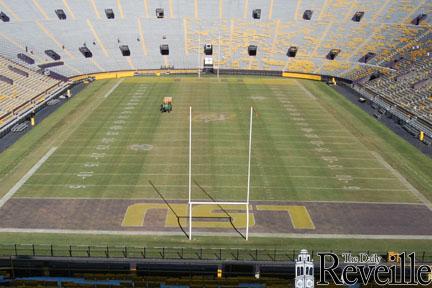For three months in the fall, Tiger Stadium is constantly on LSU students’ minds as they eagerly await Saturdays spent tailgating across campus and the march to the mecca of LSU football.
But as soon as the season ends for the LSU football team and its fans, the Tiger Stadium grounds crew begins preparations for the spring.
The hours aren’t as intensive in the winter as they are during the fall, of course. In the fall, the crew spends 40 hours per week on field labor, while in the offseason, they work 10-15 hours per week.
But once the new year comes, the grass starts growing again, the ground gets aerated and Tiger Stadium gets prepped for the annual Spring Game.
Eric Fasbender, assistant director of athletic facilities and grounds, said once spring starts, the field must always be ready for use.
“They did two scrimmages here before the Spring Game, and then they had the Spring Game,” he said. “Once spring practice starts, we have it painted because you never know when [LSU football coach Les Miles] is going to come over here.”
After the Spring Game, the crew starts to prepare for the Bayou Country Superfest, which hosted 75,000 country music fans last year.
“The stage is enormous,” Fasbender said. “You have to ensure you’re not going to have the stage shifting, but also that the ground is going to be OK after the stage comes out. From that aspect, we almost become kind of engineers.”
As soon as the two-day concert ends on Sunday night, the stage and other concert equipment is torn down and taken out of the stadium by Monday afternoon at 5 p.m.
The massive stage takes a toll on the field’s grass.
After that, contractors come in and grind off the existing field surface. Fasbender said the crew ensures everything about the field is correct by starting over new after Bayou Country Superfest.
The grass, named “celebration bermudagrass,” is newly installed in Tiger Stadium each year. It is inspected and carefully selected prior to implementation.
“We actually go out to the sod farm where it’s coming from to make sure it’s good on the ground there, so it’s going to look good on the ground here,” Fasbender said.
The Tiger Stadium grass requires a bit more care than a typical lawn.
“The first couple of weeks, we kind of nurture it along like it’s an infant,” he said. “Then after a few weeks, we treat it like a teenager. It gets some tough love and that’s when we start doing more aeration, cutting and top dressing.”
During the summer and throughout football season, the field is mowed six times per week. Frequent mowing allows the grass to grow together like a quilt, rather than upward.
Eric Harshman, assistant manager of facilities and grounds, in his first year on the crew, said the first game of the season brought plenty of jitters.
“I was coming in not knowing what to expect,” he said. “That place is going to be packed, and you’ve got to think of the millions of people around the country that are going to be watching as well.”
But Harshman said what he calls “one of the coolest jobs out there” is worth the pressure.
“I’ll be driving on campus and look at the outside of the stadium and think, ‘That’s my office,'” he said.
—-
Contact Albert Burford at [email protected]
Tiger Stadium field remains busy during offseason
May 1, 2012

A mower maintains the field of Tiger Stadium on Oct. 24, 2011.






